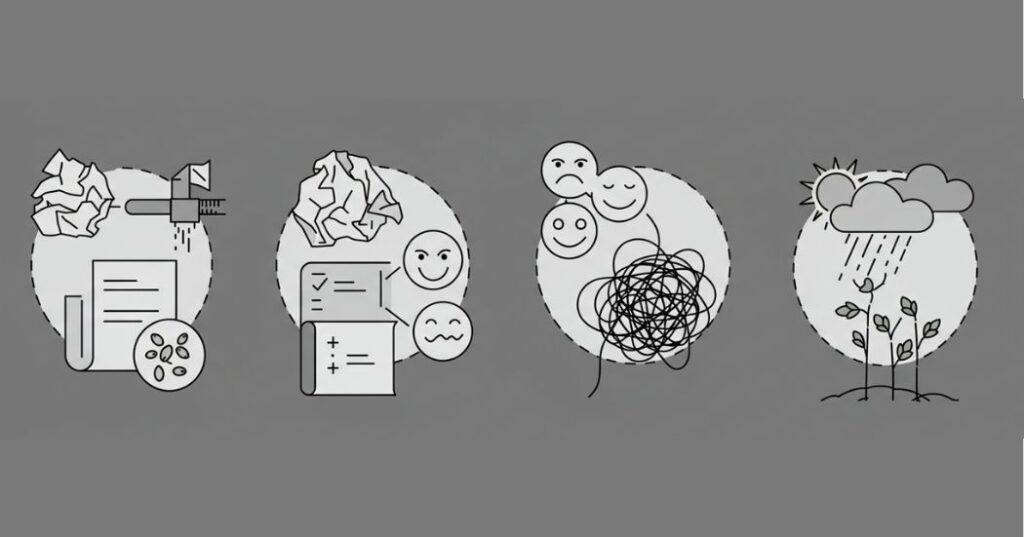Resilience isn’t about building an impenetrable wall of toughness—it’s about cultivating the profound ability to stay soft, open, and strong, especially when navigating the inevitable storms of life. It’s the art of bending without breaking, and more importantly, growing stronger from the experience. If you’ve been navigating persistent stress, significant setbacks, career uncertainties, or the nagging voice of self-doubt, journaling can be an exceptionally powerful and accessible tool to rebuild your mental and emotional fortitude from the inside out.
This guide offers 20 carefully crafted journal prompts, categorized to target different facets of a resilient mindset. They are designed to help you connect with your inner resources, process experiences constructively, and build a more robust and adaptable way of thinking, one reflective thought at a time.
Why Journaling Builds Resilience

The simple act of putting pen to paper (or fingers to keyboard) slows down the often-chaotic rush of your thoughts and emotions. This deliberate process creates a unique space for self-reflection and insight, which is foundational to resilience. Journaling helps you:
- Reframe difficult experiences: Writing allows you to step back from an immediate, reactive state and construct a more empowering narrative around challenges. You can explore different perspectives and find meaning even in adversity.
- Regulate and process emotions: Giving words to your feelings—even the messy, uncomfortable ones—can lessen their intensity (Pennebaker, 1997). Labeling emotions helps you understand them rather than be overwhelmed by them, fostering emotional agility (Tugade, Fredrickson, & Feldman Barrett, 2004). This aligns with the compassionate approach of acknowledging your feelings without judgment (Neff, 2011).
- Identify unhelpful patterns and limiting beliefs: As you write consistently, you may start to notice recurring thought patterns, triggers, or underlying beliefs that contribute to stress or hinder your progress. This awareness is the first step to consciously choosing different responses.
- Process pain into purpose and growth: Expressive writing about difficult events can help integrate these experiences into your life story in a way that promotes healing and can even lead to finding new meaning, purpose, or post-traumatic growth (Seligman, 2011; Brown, 2015).
Numerous studies on expressive writing have demonstrated its benefits, including improved emotional recovery after trauma, a stronger immune response, reduced stress levels, and enhanced decision-making capabilities, especially under pressure.
How to Use These Journal Prompts Effectively
To get the most out of these prompts, consider the following suggestions:
- Create a dedicated time and space: Find a quiet, comfortable spot where you feel safe and uninterrupted. This helps signal to your brain that it’s time for reflection.
- Set an intention: Before you begin, take a moment to consider what you hope to gain from your journaling session (e.g., clarity, peace, insight).
- Choose 1–2 questions per day or week: Don’t try to tackle too many at once. Give yourself ample space to explore each prompt deeply.
- Write for at least 5–10 minutes without filtering: Let your thoughts flow freely. Don’t worry about grammar, spelling, or making it sound “good.” This is for your eyes only unless you choose to share it.
- Be radically honest, even if it’s messy or uncomfortable: True insight often comes from exploring the less polished parts of our experience. Practice self-compassion as you write.
- Engage your senses: When writing about experiences, try to recall sensory details – what you saw, heard, felt physically. This can make the reflection more vivid and impactful.
- Practice non-judgment: Approach your thoughts and feelings with curiosity rather than criticism. There are no “right” or “wrong” answers in your journal.
- Return to past answers periodically: Reviewing previous entries can be a powerful way to track your growth, notice shifts in your perspective, and acknowledge how far you’ve come.
🔸 Foundational Prompts (Grounding Yourself in Your Inner Strength)
These prompts are designed to help you connect with your inherent strengths, acknowledge past resiliencies, and identify your anchors. Building resilience starts with recognizing the resources already within and around you.
- What does resilience truly mean to me, in my own words, right now in this phase of my life?
- Consider: Move beyond dictionary definitions. How does it feel, look, and act in your experience?
- What part of myself, or which of my qualities, have I consistently underestimated or undervalued?
- Describe a time I overcame something incredibly hard. What inner resources did I draw upon then that I might have forgotten?
- Who (a person, character, or even a part of nature) inspires me with their resilience when I feel discouraged, and what specific qualities do they embody?
- What specific practices, places, people, or thoughts make me feel grounded and centered when everything else around me feels shaky or uncertain?
🔸 Emotional Agility Prompts (Navigating Your Inner World)
Emotional agility is a cornerstone of resilience. It’s the ability to experience a full range of emotions (even difficult ones) and still choose actions aligned with your values. These prompts help you understand and navigate your emotional landscape more effectively.
- What specific emotion (or emotions) am I currently avoiding or resisting, and what do I fear might happen if I truly allowed myself to feel it?
- When I feel overwhelmed or flooded by emotion, what are 1-2 simple, reliable actions or thoughts that help bring me back to a state of calm or centeredness?
- In the midst of current challenges, what is one small, tangible thing that is truly within my control today, and how can I act on it?
- What do I need to forgive myself for right now – a mistake, a perceived shortcoming, or not meeting an expectation? How can I offer myself compassion?
- Consider: Self-compassion is key to bouncing back (Neff, 2011).
- If a dear friend were going through exactly what I’m feeling or experiencing, what compassionate and wise advice would I offer them?
🔸 Reframing Setbacks (Finding Growth in Adversity)
Resilience involves the ability to reframe setbacks not as absolute failures, but as opportunities for learning and growth. These prompts encourage you to find the lessons and strengths embedded in difficult experiences.
- What did a recent failure, disappointment, or mistake teach me about myself, my approach, or what truly matters to me?
- How has a past disappointment or “closed door” ultimately helped me grow or led me to an unexpected positive outcome or insight?
- Describe a recent challenge I handled better than I initially expected I would. What strengths or strategies contributed to that?
- If I were to face a similar situation in the future, what would I do differently based on what I’ve learned – and why is that new approach potentially more effective or aligned?
- What specific personal strengths (e.g., courage, patience, creativity, kindness) tend to show up or become more apparent in me during particularly hard times?
🔸 Forward-Focused Prompts (Building Future Resilience)
These prompts help you look ahead, not by predicting the future, but by intentionally considering how you want to cultivate and embody resilience moving forward. This proactive stance builds mental preparedness.
- What future version of myself am I currently growing into through these experiences? What qualities is this resilient self developing?
- How do I want to ideally respond to pressure, uncertainty, or unexpected challenges in the future? What mindset would that require?
- What specific habits, routines, or practices currently support my inner strength and well-being, and how can I reinforce them?
- What boundaries (with time, energy, people, or commitments) do I need to establish or strengthen to protect my resilience and prevent burnout?
- If I deeply and truly believed I could handle anything life throws my way—how would that belief change the way I show up and act today?
Printable Resource & Next Steps
📓 Want these prompts as a beautifully formatted printable guide to keep by your journal?
Download our free Resilient Mindset Journal Prompts PDF. For a more structured experience, you might also explore our 30-day guided daily writing challenge designed to systematically build your resilience.
Ready to make resilience a daily practice? Try our guided resilience journal and daily writing challenge to strengthen your mindset from the inside out, fostering a deeper connection with your inner resources.
Final Thoughts

You don’t need to be fearless or perpetually “strong” in the traditional sense to be resilient. True resilience is far more nuanced; it’s rooted in the willingness to keep showing up to your life—with raw honesty about your experiences, deep compassion for yourself (especially during struggles), and an insatiable curiosity about what you can learn and how you can grow.
These prompts are more than just questions; they are invitations to a daily check-in with your own incredible strength, a way to actively participate in your own becoming. Let this practice be a gentle yet powerful companion on your journey to a more resilient and resourceful you. Your capacity for resilience is already within you, waiting to be acknowledged and nurtured.
Related Reading: From Scarcity to Abundance: Practical ExercSises to Shift Your Mindset
📚 References
- Pennebaker, J. W. (1997). Opening Up: The Healing Power of Expressing Emotions.
https://www.amazon.com/dp/1572302380 - Neff, K. (2011). Self-Compassion: The Proven Power of Being Kind to Yourself.
https://www.amazon.com/dp/0061733520 - Brown, B. (2015). Rising Strong: How the Ability to Reset Transforms the Way We Live, Love, Parent, and Lead.
https://www.amazon.com/dp/081298580X - Tugade, M. M., Fredrickson, B. L., & Feldman Barrett, L. (2004). Psychological resilience and positive emotional granularity: Examining the benefits of positive emotions on coping and health. Journal of Personality, 72(6), 1161–1190.
https://doi.org/10.1111/j.1467-6494.2004.00294.x - Seligman, M. E. P. (2011). Flourish: A Visionary New Understanding of Happiness and Well-being.
https://www.amazon.com/dp/1439190763

